Vegetable Production Initiative Changes the Face of Cambodia
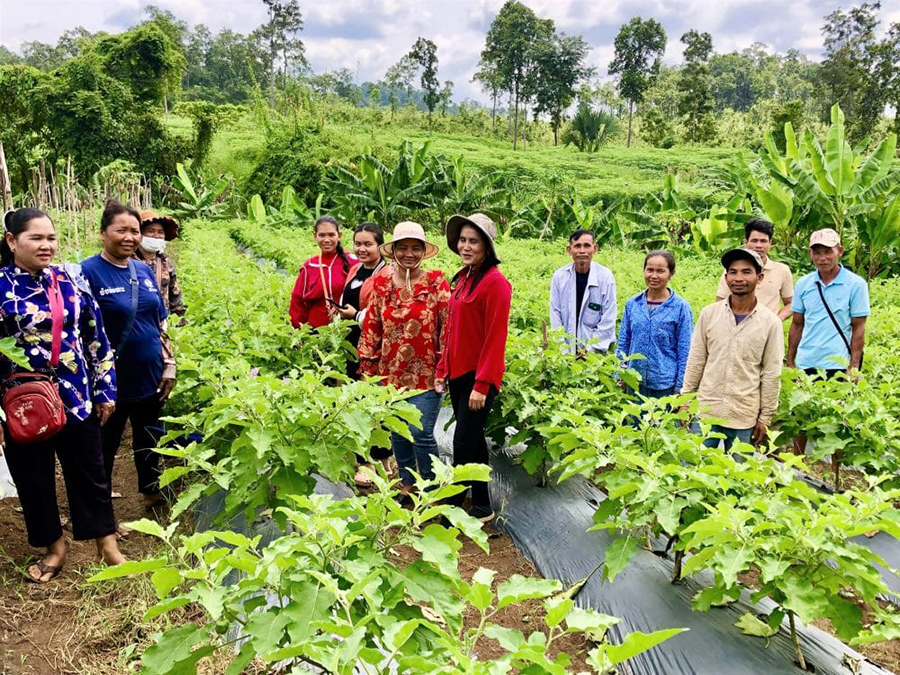
An initiative of ADRA in Cambodia is changing the face of a region’s former subsistence farming into commercial agriculture. [Photo: ADRA Cambodia]
Initiative is helping farmers to turn from subsistence farming, ADRA says.
April 27, 2023 | Silver Spring, Maryland, United States | ADRA Cambodia, and Adventist Review
An initiative of the Adventist Development and Relief Agency (ADRA) in Cambodia is changing the face of a region’s former subsistence farming into commercial agriculture, the agency leaders recently said.
Cambodia’s Veal Veng district is located about 130 kilometers (81 miles) from Pursat town and is divided into 5 communes and 20 villages with a total population of 27,484 in an area of 4,311 square kilometers (about 1,664 square miles). It is a district with potential to expand new opportunities for horticultural production and better value chain linkages for the market, experts believe.
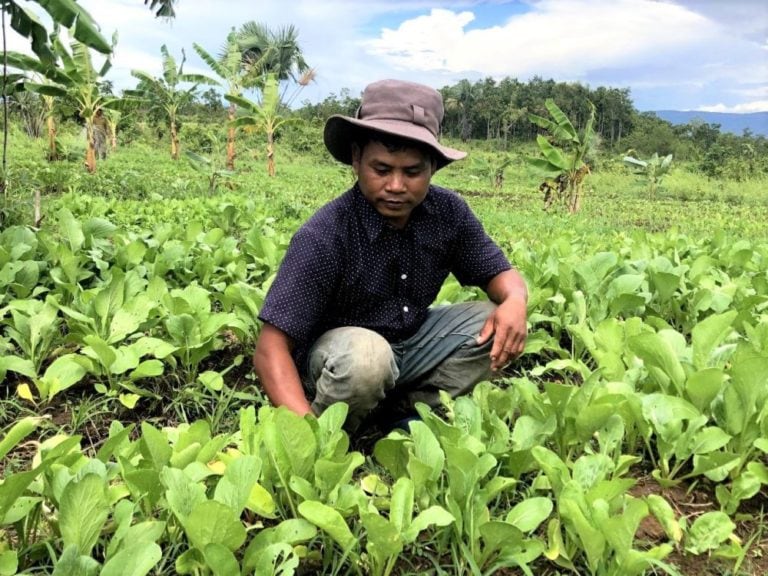
“After receiving a series of vegetable technical trainings from Pro-Market project, I gained more confidence,” Sim Touch, from Doun Neak village, said. [Photo: ADRA Cambodia]
As the area is surrounded by mountains, farmers there used to grow only industrial crops such as corn and cassava, which were a seasonal source of income, while other potential crops were not yet considered for family income. With farmers not yet adapting to horticultural production, additional incomes were dependent on timber, wild vegetables, and other forest products.
Fields were often left empty or were planted with just enough for family consumption. The infrastructure improvements led by the government has increased the potential of this mountainous area for crop production and marketing to boost future agricultural exports.
While seeing the potential as well as the constraining factors of horticulture production in Veal Veng district, ADRA’s Pro-Market project has collaborated with local authorities, including district governors, district agriculture offices, and village and commune chiefs along with their communities to form six producer groups with 125 members, each of which covers an area of about 17 hectares (about 42 acres).
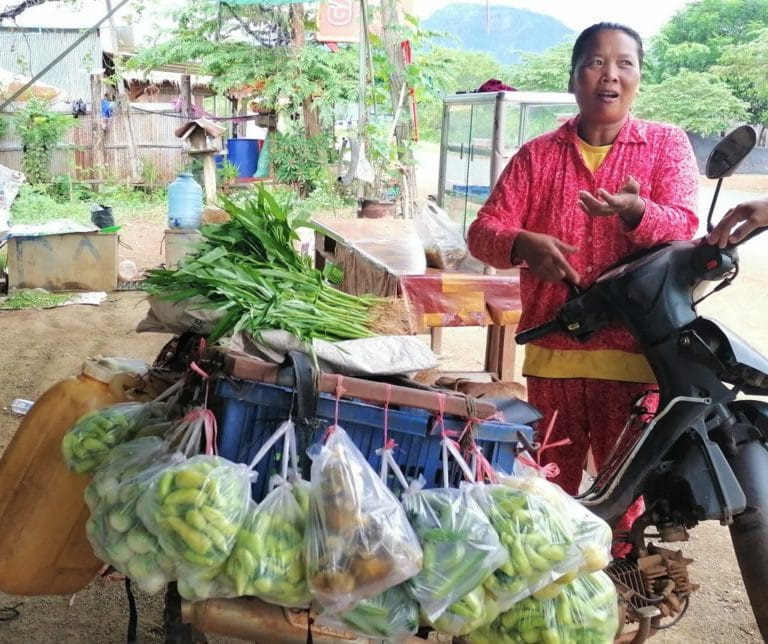
Long Sreymom, from Stieng Thmey village, has managed to increase her income, pay her debts, and support her family’s daily needs. [Photo: ADRA Cambodia]
Based on the evidential confirmation from model farmers, those who have adapted have made significant improvements in commercial vegetable production. In turning from subsistence farming to commercial agriculture, the expansion of vegetable farms has increased from 20 to 95 percent in three years. Yields have also increased from 19 to 91 percent since the first year of project implementation.
“After receiving a series of vegetable technical trainings from Pro-Market project, I gained more confidence and started to transform the vacant land that once was left without crops to be a commercial farm,” Sim Touch, from Doun Neak village, said. “It gave me higher income to improve my family’s living standards and … better handle my bank debt. My farm was very impressive to the Veal Veng district governor and [those] from the Ministry of Environment who came to visit and express their appreciation that I was able to adapt practices and improve abandoned land into a diversified vegetable farm,” he said.
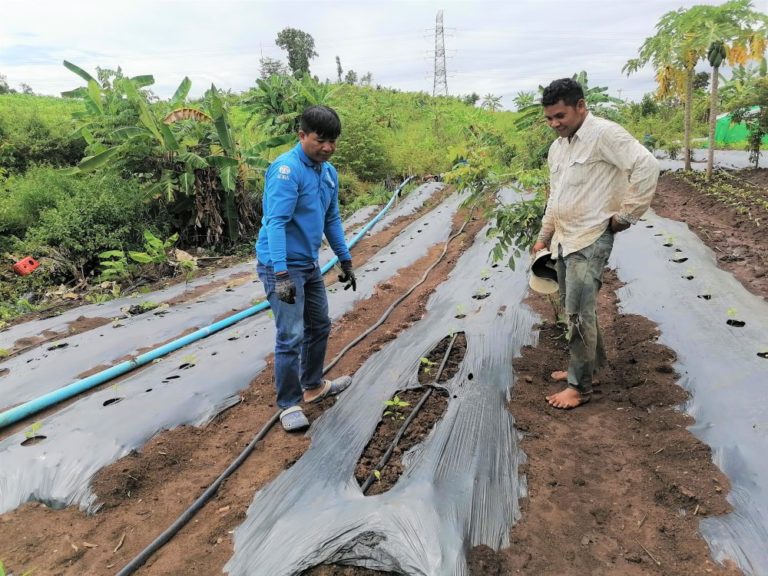
Kloy Tep, from Doun Neak village, is happy to have extended the capacity of his farm. [Photo: ADRA Cambodia]
Stieng Thmey village’s Long Sreymom shared that, due to an accident and resulting medical expenses, her family was in debt and struggling to pay the interest to the bank. “After joining the producer group, I received training in both vegetable growing techniques and marketing knowledge, and my daughter was trained to become a vegetable collector,” she said. “This has enabled my family to increase our income and be able to handle the bank interest payments and to support our family’s daily needs. Growing vegetables has created an important source of income for my family.”
Pen Sithol, from Tompor village, added that through skills and experiences she gained from the project, she has built her “ability and confidence to start … investing in a commercial vegetable farm and connecting with premium markets in Phnom Penh.”
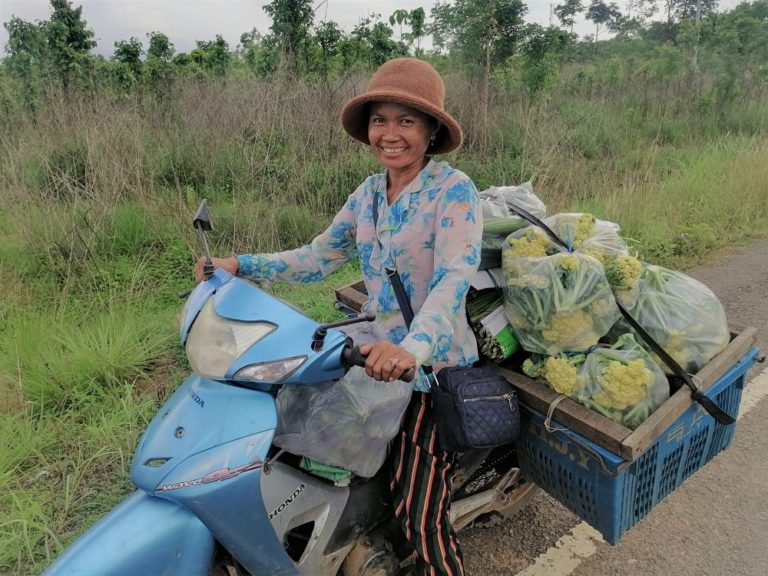
Nob Kolab, from Anlong Reap, said that compared to the beginning of 2020, her family economic situation has improved almost 100 percent. [Photo: ADRA Cambodia]
Ai Seanghay, from Krasangpnov village, said that her producer group has made a significant contribution in motivating producers to work together to link its products to other partners.“At the same time, we have built farmers’ confidence in expanding on commercial production,” she noted.
“Compared to the beginning of 2020, my family economic situation has improved almost 100 percent,” Nob Kolab, from Anlong Reap, said. “Selling vegetables every month, I am now earning enough to support my family for food and other household necessities.”
The original version of this story was posted by ADRA Cambodia.